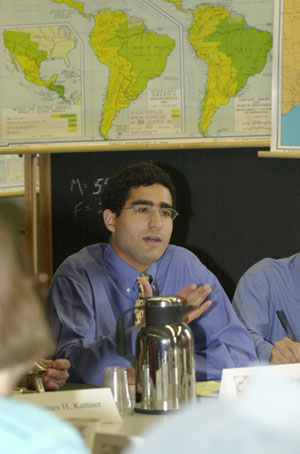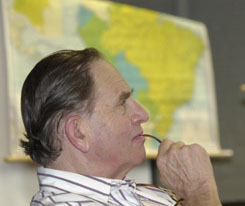Talking about revolution

During the late 18th and early 19th centuries, revolutions and rebellions were occurring at a rate that made established regimes tremble. In addition to the American Revolution of 1776, the French Revolution of 1789, and a dozen rebellions that swept across Europe from Italy to Ireland, there were slave insurrections in Surinam (1763) and Haiti (1791), an unsuccessful rebellion in the Brazilian province of Minas Gerais (1789), and, between 1816 and 1824, a series of revolutions in South America led by Simón Bolívar and José de San Martín.
What forces were driving these struggles for independence? What influence did they have on one another? What did they have in common? For the past two weeks, a group of young scholars have gathered at Harvard to consider such questions. The International Seminar on the History of the Atlantic World met for its sixth year this August to consider the topic of “The Atlantic Revolutions, 1760-1825.”
“It’s the cross-national element that’s so interesting,” said the seminar’s director, Bernard Bailyn, the Adams University Professor Emeritus. “This seminar gives us a chance to examine the common themes that span different countries.”
Focusing on the Atlantic area as a whole rather than on a single country adds a new perspective to questions that have fascinated historians for decades, said Bailyn. Why, for example, did the revolutionary regime of the United States achieve relative stability while those of Latin America fell prey to military takeovers and civil war? Other phenomena, such as migration and the slave trade, only make sense when looked at from a multicountry perspective, Bailyn added.
The Atlantic history seminar originated in 1995 with a grant from the Mellon Foundation, in conjuction with the Charles Warren Center for Studies in American History. Its aim is to advance the scholarship of young historians of many nations interested in the common, comparative, and interactive aspects of the peoples of the Atlantic world, to help create an international community of scholars, and ultimately to further international understanding.
The seminar meetings, each on a different broad theme, have been followed by two workshops annually on problems of resources for further study. This year, the 22 seminar participants included representatives from Argentina, Brazil, France, Mexico, Panama, Surinam, Sweden, and the United Kingdom, as well as the United States.
Júnia Furtado, a participant who teaches history in the Federal University of Minas Gerais, Brazil, appreciates the opportunities for cross-national discussion that the seminar affords. Furtado is currently studying the impact of the European Enlightenment on political events in Brazil and other South American countries.

“The history of Brazil is so different in many respects from the rest of Latin America that historians now are trying to find links between events there and those in these other countries. It is wonderful to see so many people working on the same subjects who are able to understand the differences and similarities,” she said.
The seminar is set up to maximize such exchanges. With 10 days of meetings, each devoted to the discussion of papers by the participants, a high degree of intellectual camaraderie results. The intensity of these exchanges is enhanced by the fact that most participants are staying at Irving House, where they enjoy spirited dinners together. The atmosphere is one that past participants have compared to “an intellectual summer camp.”
Hakiem Nankoe, a scholar from Surinam, educated at the University of Amsterdam, and currently a fellow at Cornell University, was favorably impressed by this heady ferment: “These 10 days of intense discussion were very refreshing for me,” he said. “The subject matter is fascinating and very important in this era of globalization because this is the period in which the foundations of globalization were laid. The papers have been of a very high quality, and together they provide an overview of the subject that wouldn’t be possible otherwise.”
Bailyn, who helped create the idea of Atlantic history, believes that in its six years of existence the seminar has been a resounding success.
“I think it’s gone wonderfully well,” he said. “The net impact is very hard to measure, but as far as one can tell, it seems to have had a broadening effect on historical study all over.”
Bailyn noted that there are now teaching programs in Atlantic history at a dozen American universities; international conferences on the subject have been held in Germany, Holland, and Scotland; and books and articles on the topic appear regularly.
The advantages of studying history from an Atlantic perspective are many, Bailyn said.
“As a subject, it’s very convenient both for research and teaching. It draws together more than one nation’s history and helps to put American history into context.”
The concept of Atlantic history came about through the intersection of academic currents with political events in the wake of World War II such as the creation of NATO, Bailyn said. Since the linkages among countries that border the Atlantic still play a vital role in today’s world, awareness of the Atlantic context is important for historians and nonhistorians alike.
“We’re all part of the whole world, but we’re deeply part of the Atlantic world. Historically speaking, that’s where we come from. Our society has been formed within the Atlantic world.”




